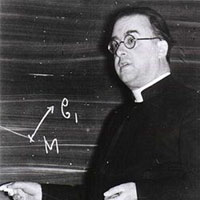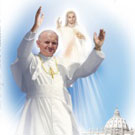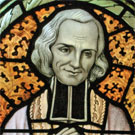Casper — a reader of this blog — has e-mailed this question:
Fr. John if somebody is interested in becoming a priest and feels especially called to serve the Church and God through academia – eg. doing a doctorate in philosophy – becoming a Catholic philosopher and working in defending the Church’s teachings against secularism, doing apologetics or teaching philosophy at a university or seminary, then what would be the best group to join? The secular diocesan priesthood or a religious order. While I think traditionally religious orders were a good option, due to their incredible decline I feel that the most flexible and better suited for my particular calling would be the diocese. Any guidance will be awesome.
This is a good question which raises, I think, two different stages of discernment.
My plans and God’s plans
Firstly, we have to discern what we’d like to be and what we’re called to be.
For a long time, I wanted to marry and have a large family, like my father and my grandfather. And I wanted a career in politics, like St Thomas More.
I wasn’t blithe in these comparisons. I took seriously the universal call to holiness. As well as being a husband and father and politician, I wanted to be a saint. So my interior plan of life was pretty intense. Daily mass. Spiritual reading. Meditation. Frequent confession. Spiritual direction. This isn’t just the domain of priests and religious. I recommend it for all Catholics.
As I began my honours year, I was faced with a decision. Upon graduation, do I seek work in an MP’s office? Or do I embark upon postgraduate studies? I prayed about this. For months I prayed. And prayed. And prayed.
And then I meditated on our Lord’s encounter with the rich young man. This gospel is proclaimed on the 28th Sunday of Ordinary Time, in year B. The night before, I listened to a preached meditation on the Sunday gospel. The priest made several points which I remember very well:
Our Lord invited, but did not impose. Our Lord loved the young man, but let him walk away. The young man was good and generous, but attachment held him back. He left in sorrow. A failure to respond generously to the Lord’s call produces sadness.
I didn’t want to be like that young man. So my prayer that night was an unqualified yes.
Until then, my prayer had been a question. “What is your will Lord? Advise me.” Now my prayer was an answer. “Lord, I will go wherever you send me. My answer is yes.”
The next day — Sunday 12 October 2003 — is the day I discerned my priestly vocation. I was at Mass at St Patrick’s Cathedral. At some point in the Eucharistic Prayer, I pictured myself in place of the priest, standing at the altar, offering the sacrifice. The idea filled me with joy and sorrow, excitement and dread. I had never seriously entertained the idea before. It did not attract me. Now it was overwhelming. And it did not come from me.
Based on that experience, I think the first step in vocational discernment is to distinguish one’s own ideas and plans — no matter how noble and pious — from God’s ideas and plans. Hopefully they coincide! But don’t assume that. Prayerfully discern it.
Serving a charism
Now maybe Casper has done that already, and he believes that the academic priest thing is God’s plan, not his own. I can believe it. Apparently, Fulton Sheen was still in the seminary when he discerned God’s plan for him to be a bishop! (Happily, I’ve never been burdened with that one.)
I’m no expert, because I never went through any discernment vis a vis religious life. But I imagine the Jesuits and Dominicans are two obvious choices, which merit investigation. By that I mean speaking to SJ and OP seminarians, contacting vocations directors, and going on their retreats and other means of formation. Perhaps readers can recommend additional orders and congregations.
A diocesan priest does not have the license to insist on a particular assignment. Speaking personally, I’m attached to the idea of being a parish priest in a country parish. My own Ars! I like my chances, but I don’t presume it. My task is to serve and obey my bishop, and my own preferences are always subordinate to that. So if you were to sign up to the diocesan priesthood Caspar, you would have to renounce your aspirations to the academic life.
Now that’s not to say you would be denied an academic assignment. I often wonder what would have happened to the rich young man, if he had renounced his property and followed the Lord. It may be his wealth and privilege were restored to him. We’ll never know. All we do know is that his failure to respond generously produced sadness.
God forbid any of us follow the same path.






Thank you Father for the advice.
As a diocesan are you allowed to express the fact that you have an interest to undertake further study or engage in a doctorate or apologetics and evangelization.
For example are you allowed to tell your bishop that you really have a strong interest in doing further study or a phd in philosophy.
How likely are you to get that desire or wish answered? I really do love thomism and metaphysics. I will obey and do whatever God wants. I will abandon myself. However I do feel called to do this. Are you likely to get an assignment you express a strong interest. Are you even allowed to express an interest in a task you really feel called to? Doesn’t the Diocese promote higher education?
I think that’s the first key – how likely do you think it would be that I would be allowed to doctorate as a diocesan? I could still be a PP and dot apologetics as a hobby but having a doctorate is always a pre-requisite in that field.
My goodness, yes! Diocesan priests are certainly welcome, and indeed encouraged to indicate an interest in further study. Most bishops take very seriously their obligation to care not only for the Church of the present, but also the Church of the future.
In my time in the seminary, several students were sent to Rome to complete their training there and embark on higher degrees. Many more are sent overseas for further study after ordination.
If you proved yourself academically proficient, there’s a good chance, I imagine, that you’d be invited to pursue a doctorate. However, I’m doubtful you’d be able to study in the field of your choice.
In the first place, bishops want a balanced spread of expertise in their presbyterates. It’s not very helpful to have ten trained philosophers, but no theologians and no canon lawyers. So bishops can and will exercise veto over the field of higher study.
In the second place — I can only speak for Melbourne’s CTC, though I imagine the same holds true elsewhere — apologetics is out of favour. When we as seminarians requested training in apologetics, the idea was sneered at. Most present-day lecturers at theological institutes view apologetics as anti-intellectual, and counter-productive. Of course you and I know better, but as you’d be aware, our worldview is quite different to the worldview of older generations.
Incidentally, you might be interested in an excellent paper Fr Marcus Holden presented at the 2011 ACCC Conference: Apologetics and Evangelisation.
Father it is so true that apologetics is snared at and even suppressed in the Catholic Church. This is very sad, and in fact why I am so attracted to it. The best defenders of theism in the modern day are almost all entirely Protestant Christians.
Father, as you also know, many theology departments are highly compromised. That is not me speaking out of ignorance but what Peter Kreeft the Catholic philosopher and apologist has stated.
Sorry to bother you Father, but perhaps can you elaborate a little on what you mean that it is doubtful I would be permitted to study further in my field of interest?
For instance, my understanding is that you have to pick a major in your seminary studies. If you selected philosophy as your major and focus, doesnt that mean that you would have a somewhat good chance of getting that? What if you also wrote to the Bishop and explained that you will always do what Christ through the Church asks you to do in obedience, but that you feel a strong calling to study philosophy and have a very strong passion for thomism and analytical philosophy. Would that help?
I know the story about Bishop Sheen. He prayed 3 Hail Mary’s every day to become a Bishop, not bc he wanted power but bc he felt that was his calling.
I too feel this calling. Its absolutely terrible that the current defenders of the Church are almost entirely lay people – on issues of apologetics and natural theology.
I mean I could keep the whole apologetics thing to myself. I could just express first the desire to study philosophy and then after that takes place I can cross the apologetics bridge when that comes.
In any event once that period of study takes place I am qualified (if God so wills) with a doctorate in philosophy then I can at the very least in my spare time on whatever assignment study privately and respond to the objections to the dogmatics of the Church and especially the secularism.
I only want to go down this path bc I love God and feel there is a huge lack in this area. I want to glorify Him and defend His true Church and its teachings.
Thank you Father.
Hi Caspar!
It’s not true that seminarians pick a major. Not in this country, anyway. The ordination course is designed in Rome, so naturally enough it’s not especially sensitive to the needs of Australian-designed degrees.
Any bishop would commend a priest’s interest in philosophy, and he would facilitate study in his preferred area if he could. A happy worker is a good worker. But if the diocese really needs a canon lawyer right now, or someone to lecture in moral theology, that’s where he’ll send his next priest bound for higher study. An individual’s preference is subordinated to the needs of the Church.
Incidentally, I can’t share your distress at the preponderance of lay theologians and apologists. I don’t know. Maybe I’m missing something?
This article by Fr. Holden is incredible and so true.
Father, I have been studying apologetics on my own, and like I have stated when you watch debates or seek books defending the existence of God, the reality of the Resurrection or reliability of the scriptures they are almost exclusively Protestant.
The few Catholics involved in the field are almost entirely part of the laity. I find this very depressing.
The worst is the issue of theism. The Church has now responded reasonably well against Protestant objections – but again the modern day response has come from the lay theologians. Still its been great.
However on the issue of atheism and secularism its been in my view terrible. There are no Catholic equivalents to William Lane Craig, Alvin Plantinga, Richard Swinburne or Ravi Zacharias or Lee Strobel. Fr. Spitzer did compose one book, but that is one to a ratio of many many non-Catholic Christian responses.
I feel the response is very important because defending theism requires a healthy dose of theology as well. For example, the flawed theology of Plaintinga, Craig and Swinburne mean that in their brilliant defense of theism they also fall into heresy by denying divine simplicity and divine timelessness. Therefore I really feel we need Catholics doing natural theology as well.
That is why I am so passionate about this issue Father.
Can I ask you Father, I know this is a difficult question, but how was your academic experience in your priestly studies? Was your theology department faithful to the magisterium? Did you receive a strong and relevant training which would allow you to respond to the objections hurled against the catholic faith? Were the majority of your professors orthodox?
God bless you and thank you so much for taking the time to respond to my queries.
You may find this link interesting:
http://www.catholiceducation.org/articles/education/ed0392.htm
Here is an interesting paragraph:
Most Catholic universities today have philosophy departments that are excellent spiritually as well as academically, but have deeply compromised theology departments. Their effect on students is much more often to weaken their faith than to strengthen it, not only in controversial moral issues such as abortion, contraception, cloning, euthanasia and sexual morality, but even in fundamental doctrines such as Christ’s divinity and resurrection and the historical truth of the Gospels.
None of my theology professors were downright heretical. My best professors were at the JPII Institute.They were not only not-heretical, which is one thing; but they also “thought with the mind of the Church,” which is another thing entirely.
Is the course that every priest has to do the STB – Bachelor of Sacred Theology? Is this the course you said was set by Rome and every priest does without choice? Would that be the same in every Australian diocese?
The course required by Rome is simply “the ordination course.” For many years — at least in Australia — there was no university degree awarded for it. “Just” ordination. (I use that term advisedly, since sacred orders, not a degree, is a seminarian’s main game anyway!)
In my case, my time in the seminary earned me a Bachelor of Theology, a Graduate Diploma of Pastoral Studies, and a Masters of Theological Studies (course based). These degrees are awarded by the MCD University of Divinity. Every seminary in Australia has its own distinctive arrangements.
Fr John and Caspar, I am grateful to you both for highlighting the abysmal lack of apologetics in the Catholic world. Apologetics is vital for both priest and lay person, to enable them to bring the faith alive to others.
I am aware of my lack of skills in this area. Caspar, can you recommend any Catholic apologists who have written helpful and stimulating books on this? It is a terrible scandal that priests have been deprived of apologetics training in the seminary.
Surely apologetics is where the Holy Spirit whispers in the ear and the enlivened words come from the mouth of the person!
Hi MuMu,
What a fantastic question you ask!
I have spent a lot of time reading apologetics in many different areas and so perhaps I can provide some direction.
The first problem is that apologetics in one sense if very broad – it can be apologetics in the sense that you are defending the Church against other religions like Mormonism or Protestantism or that you are defending the Church against atheism and skepticism or that you are even defending the moral teachings of the Church.
With this in mind, I would consider reading the following: (i) Handbook of Christian Apologetics by Peter Kreeft (ii) The Catechism of the Catholic Church and I still love the classic (iii) Catholicism and Fundamentalism by Karl Keating.
Those three texts alone will provide almost everything a lay Catholic will ever need to know.
However, my advice is after that you focus on an area of interest. If for example you like defending the moral teachings of the Church, try and study those eg books like Catholic Bioethics by Fr. May. If you like defending the Church’s teachings to a Protestant then you can read A Biblical Defense of Catholicism by Dave Armstrong.
I think since atheism is such a prominent issue at the moment that every Catholic, in addition to the books mentioned above should also read two more books: (a) Aquinas by Edward Feser and (ii) The Last Superstition by Edward Feser.
I think MuMu also think of apologetics as giving nourishment for your soul and therefore treat is as a lifelong hobby or spiritual exercise.
A few works of caution. Apologetics can be dangerous, because many of the enemies and critics of the Church are former Catholics, Priests, Bishops, Theologians who have become atheist or another religion. Therefore you need to understand the purpose of apologetics. Its not to convince others and to use it as a weapon to convert. It is first and foremost to realise for your own self that the faith is not merely based on BLIND irrational dogmas, but rather it is based on revelation which is informed by reason and embraces reason. So it strengthens your faith. You and I MuMu already know through the Holy Spirit, His witness and direct revelation that God exists. We don’t need to have any further reason. However, knowing things like the Moral Argument for God’s Existence or the Teleological Argument for God’s Existence allows us to know that our faith is not just true but well informed, and this strengthens our faith. It also helps us overcome any doubts we may have, since we know we are not just accepting something blindly, but we have embraced a rich tradition of faith which seeks understanding.
Secondly, you need to know, because apologetics can be confronting that you need to be steeped in the sacraments and spirituality as well. I would not advise reading several apologetics books at once. I would advise that you read one apologetics book with one spiritual book. So for example, read ‘The Story of a Soul’ while you are also reading the Handbook of Christian Apologetics. When you read Catholicism and Fundamentalism also read The Interior Castle by St. Teresa of Avila at the same time or when you read the Last Superstition also read ‘The Imitation of Christ’ or ‘True Devotion’ at the same time.
That way your focus will remain on Christ and not get lost as some do in ultra-rationality (the oppositive of fideism), scientism, empiricism or obsession with proofs. Remember the idea is to first strengthen your own faith and then secondarily to be able to explain and share your faith with others.
Thirdly, remember the focus of apologetics always. When it comes to the secondary reason of sharing your faith you must always do so very gently and always err on the side of ecumenism and charity as painful as it might feel deep down inside. Its always better to be too gentle then to be too rough. Its not about showing a Protestant that their faith is anti-historical or based on a flawed reading of the scriptures and disconnected from the Early Church – its about the salvation of souls and trying to bring a human into the fulness of the truth.
Keep in mind most people will reject you and not listen but if you understand that you are doing this for the love of Christ then it does not matter if most people don’t want to listen. Respect that, and dont talk about things they dont want to. But you will meet many people that will like to talk about these issues, and if you can share with them things like Aquinas’s 5 proofs for the existence of God it may plant seeds which the Holy Spirit can use to eventually lead them into truth.
Finally, here are some free resources:
ATHEISM V CATHOLICISM
http://www.strangenotions.com/
See especially the link to Peter Kreefts arguments for the Existence of God and pay special attention to the Moral argument.
CATHOLICISM V NON-CATHOLIC RELIGIONS AND MORALITY
http://www.catholic.com/
On Catholic Answers (the second link) there is so much information you may not even need to even buy any resource! It does not deal with atheism but almost every thing else is taken care of.
Browse the tracts, study the articles and have a look at the ‘quick questions’.
Look up the usual topics of interest – Praying to Mary and the Saints, The Authority of the Pope, Baptism and the Sacraments, Penance and Confession, Sola-scriptura, Sola-fide, Contraception, Purgatory – its all there. Do keyword searches, and you will find the answers – play around with it and just read things you are interested in. I guarantee if you spent some time each day on this site researching these things you are interested in by the end of the year you will be able to defend most of the common objections hurled against the Catholic Church.
Hey MuMu, just to clarify what I meant by apologetics being dangerous. Since many apologists on the other side are former Catholics or Christians if one does not approach it with the sacraments and prayer it can be confronting. However its very easy to get around. Keep in mind my advice regarding spiritual books as well as apologetics, make confession often and get a great spiritual director.
Apologetics changed my life and helped save my soul – it led me out of error and into the fullness of the Catholic faith. It gave me an unshakable faith and increased my relationship with Christ.
Thanks very much, Caspar. Very sounds advice, I’ll refer to it. Have to confess I got fired up about the whole subject and before I read your post I found I had downloaded into my kindle Peter Kreef’s A Summa of the Summa and his Handbook of Christian Apologetics … the latter being a kind of fast-food book on the subject, but it will start me off before I try and delve into something more involved.
I’ll take your advice; and thank you for a very stimulating discourse on Fr John’s blog. As Fr says, it is largely up to the laity to evangelise the faith. But as well as having lots of files stored in the mind on lots of subjects, we also need to know how best to deal with the person we’re talking to. I don’t think I’d open my mouth if it was an ex-priest or an educated by modernistic or traditionalist Catholic – too difficult for me.
Good on you mate. Just keep in mind, there is no such thing as a liberal catholic, conservative catholic, modernist catholic or traditionalist catholic. You are either Catholic or not Catholic.
Im sure you will enjoy those books. Summa of Summa is great although I would have left that for a little later 🙂
Fr. John is absolutely spot on. This is a lay problem (lack of catechesis) and it will require a lay solution.
Fr. John being a Parish Priest in the country – lol kind of like St. John Vianney, will not be able to be giving complex sermons on apologetics nor is that appropriate or accessible. Therefore its the laity who need to step up here and help out. Maybe you MuMu can form an apologetics group where people from the Parish study apologetics – like a section form the Catehcism or focus on fleshing out an issue like say the Veneration of Mary. If thats too much, then maybe just try and get your friends in the Parish to start getting more involved in apologetics. Encourage them to read the books you are reading and whenever you have a question – dont just leave it alone. Go to Fr. John and ask him. If you dont know why you need to go to confession or why you need to be baptized and are confused about it Im sure Fr. John can provide the answers. So its all about an ongoing pursuit of truth. Good luck. You are in my prayers.
MuMu, when it comes to talking to other people its very easy. Ill give you to things to keep in mind.
(i) know your limits.
its its an ex-nun or liberal sister or hostile atheist who is closed off. stop and move on. you cannot reason with some people and you need to cut your losses, ask Jesus to save them and consecrate them to the sacred heart.
its very important you know that. most rad-trads and ex-christians will be like that. get a feeling for it, if you sense they are hostile and just too closed off, leave it, and move on.
the best thing you can do for such a person is to be friends with them, be kind and loving to them and show them the love of Christ by being nice and friendly.
if the opportunity arises like a birthday and they are a close friend or family member, then you can get them a gift that will also help like Mere Christianity by CS Lewis or the Last Superstition by Feser. However, apart from something like that you must not go any further to a person who is closed off. no amount of reason or talking will help.
So rule one – know your limits – as soon as you sense that they are closed off and absolutely so closed off they are not open to any truth or reason, leaven and move on.
(ii) Rule 2 is simple and what I said before – gentle, gentle, gentle – its always better to be too charitable then to be too harsh. Some people freak out when you ‘look’ ecumenical and they assume you are a modernist but its better to me slighly too ecumenical then to be too harsh. It can be painful to be ecumenical but its better then being harsh.
So you were able to gain a masters level
Education in seminary? That’s quiet impressive. Would that be a standard thing – would most seminarians do a masters? I live in the Sydney Archdiocese. What was your maters in?
Do you have a favourite saint or spiritual book? I’ve seen some diocesans get an STB – have you ever heard of that?
Father, regarding my comments about a major, I was not referring to the ordination course, but rather to the undergraduate degree in theology. For instance in your BTh at CTC you would have had to select a major correct? My point was that in my training and academic formation, I also will have to take on a degree in theology and my point was I would major in philosophy and therefore I was saying, wouldnt that arguably raise my chances of doing graduate study in philosophy as opposed to an area I did not major in like Canon Law or Theology?
Ive seen some priests who have a BTh and some others who have a STB. Are you aware of the difference and how that works?
OK I really need to apologise here for wasting your time with all these messages and taking up so much of your time. I feel so bad. Please forgive me, but you’ve been so great, and Ive encountered so many unhelpful or apathetic priests that I really felt I needed to ask these questions to somebody willing to answer.
I promise I will exercise caution and not bother you with any more questions. God Bless you.
Oops. Sorry. I was a bit misleading. In Melbourne, at least, seminarians don’t do any electives. They enrol in what the Dean of Studies decides, and for his part, he refers to Rome’s requirements for ordination.
The degrees I earned were accidental, insofar as they were awarded for units I studied for the sake of the ordination course. I think the major in my BTheol was philosophy, which is crazy, considering I already had a BA (Hons) in philosophy. But philosophy is the major the ordination course demands.
Every Corpus Christi seminarian earns the MTS. This degree was basically invented for seminarians, so that their years in the seminary furnished post-grad credentials. Not because priests need a Masters, but because the study has to be done anyway, so why not get a degree for one’s efforts?
Sydney would have a totally different arrangement. For all I know, up there you are able to choose one’s major, and maybe even one’s degree. In which case all the advice I have given is entirely moot. Ha ha.
I have dozens of favourite saints. I am always reading about the saints, and praying to the saints, and imitating the saints. Though I’m not very good at that last one. Ha ha.
The two men on whom I model my spiritual life and ministry – secondary to Our Lord himself of course – are St Jean-Marie Vianney and St Josemaría Escrivá. Great priests. Great men.
Thanks Father. As a priest what’s your thoughts on the matter regarding the failure of the Church in defending its theology against the atheists and skeptics. All the leading defenders of theism at the moment are Protestant – Plantinga, Swinburne, Craig are all Protestant.
I have a bit of a headache after reading the posts of this Casper guy. A PhD isn’t the only way to “defend Catholicism”. Go feed the hungry, love the unlovable and pardon the unpardonable.
Also, look up in the dictionary the word “ecumenism “ and stop name calling those “Protestants”. Go and sin no more.